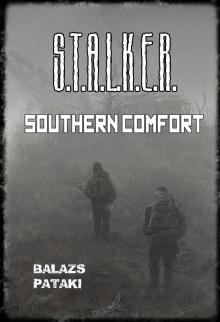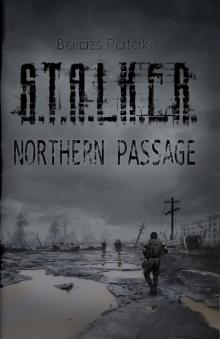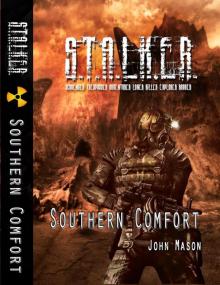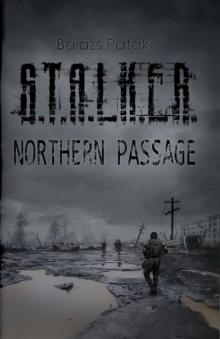- Home
- Balazs Pataki
S.T.A.L.K.E.R.: Southern Comfort s-1
S.T.A.L.K.E.R.: Southern Comfort s-1 Read online
S.T.A.L.K.E.R.: Southern Comfort
( S.T.A.L.K.E.R. - 1 )
Balazs Pataki
To outsiders, the former USSR is always been a place where everything is strangely different. All the more so in the Exclusion Zone around the ill-fated Chernobyl power plant, where after a secret experiment went wrong in 2006, the laws of physics are bent and mysterious phenomena manifest.
In 2011, Al Qaeda detonates nuclear warheads in Kabul. In what was once the Afghan wilderness, apparently a New Zone is created.
Three years later a scientific expedition tries to find out if the creation of the New Zone could be connected to the Chernobyl experiment. When the researchers disappear, a search and rescue operation is launched.
For Major Mikhailo Tarasov, a veteran of the Exclusion Zone, this mission into post-apocalyptic Afghanistan is more than just another dangerous task: in the land where his father died, he must also confront the ghosts of the Soviet past.
Major Tarasov and his Spetsnaz commandos soon find themselves at the mercy of a hostile environment worse than anything they had encountered before. But beyond all the perils of the New Zone, the most lethal danger awaits: betrayal.
Balázs Pataki
as John Mason
S.T.A.L.K.E.R.
Southern Comfort
“People are mistaken in their belief that they understand the essence of what the Zone truly is. Some consider it a universal evil, others — a wonder sent down to humanity, and others still consider it no more than a source of riches…. They are all wrong. The Zone is impossible to understand when viewed through the prism of human perception; moreover it is far too early for humans to even try.”
Professor E.F. Kalancha
(referred to by Stalkers as Beanpolev)
Prologue
The Independent, 3 March 2001: Taliban destroy ancient Buddhist relics in Bamyan, Afghanistan. International pleas ignored by fundamentalist leaders.
Kiev Post, Top Stories, 17 August 2001: Ukrainian authorities seal off the Exclusion Zone around the Chernobyl Nuclear Power Plant after a bus carrying foreign tourists disappears close to Pripyat.
CNN Breaking News, 4 March 2006: Blinding light illuminates the sky above the Chernobyl Nuclear Power Plant, according to witnesses.
BBC Top News Story, 10 June 2006: The skies above Ukraine’s ill-fated nuclear power plant are once again lit by bright light. Aided by the military, local law enforcement desperately tries evacuating the few villagers who remained in the Exclusion Zone after the deadly and still unexplained emission a month ago.
Fox News, 25 September 2006: In a press conference, General Dan K. McNeill, the newly appointed ISAF commander refuses to comment on questions about the Taliban’s alleged efforts to obtain nuclear warheads from Pakistan.
Kiev Post, Top Stories, 28 December 2009: A group of Ukrainian scientists led by Professor Sakharov have succeeded in penetrating into the Zone to a depth of one kilometer and returning without incident or injury. Professor Sakharov would not comment on questions regarding the special equipment that had made this possible, but did say that “this major breakthrough would not have been possible without the continuous research in Ukraine to design devices and protective gear suitable for exploring the Zone.” However, he confirmed “the existence of scientifically unexplained, anomalous activities in the physics of the Zone, as well as mutations in its flora and fauna”.
The Guardian, May 5, 2011: A leader of al Qaeda’s branch in southern Yemen on Wednesday vowed revenge for the US killing of the worldwide network’s founder Osama bin Laden. “We will take revenge for the death of our Sheikh Osama bin Laden and we will prove this to the enemies of God,” he told AFP, contacted by telephone from Yemen’s southern province of Abyan, an al Qaeda stronghold. “They will see what they haven’t expected… We are preparing a plan to continue jihad in the coming period,” said the al Qaeda leader, requesting anonymity for “security reasons.”
Fox News ticker, 6 June 2011, 03:42:58 PM ET: President to address nation following nuclear detonation in Kabul.
MSNBC.com, 7 June 2011, 01.35:46 PM ET: The top U.S. commander in Afghanistan has described the nuclear attack in Afghanistan as “the last resort of an inhuman and despicable enemy to martyr themselves en masse and deny us the claim of victory”. The ACLU has strongly condemned his choice of words, describing them as “culturally insensitive”, while in Germany, France and the UK thousands have protested, blaming the United States and Israel for the atrocity.
The Guardian, 20 August 2011: It has now been verified by several independent sources that the nuclear explosions that devastated the capital and a vast surrounding area in Central Afghanistan were caused by three low-yield warheads of approximately 20 kilotons each, and were the work of insurgents or Al-Qaida extremists. The detonation was six times more powerful than the atomic bomb dropped on Hiroshima and three times more powerful than the explosion at Reactor Four of the Chernobyl Nuclear Power Plant in 1986. A US Army spokesman has denied comments regarding the origin of the warheads after reports claimed that they were acquired from Pakistan’s nuclear arsenal.
Pravda.ru Latest News, 25 October 2011: Federal government warns Russians citizens against travelling to the Chernobyl Exclusion Zone following a skirmish between the Ukrainian military and a group of paramilitary individuals calling themselves “Stalkers” — an acronym for “Scavenger, Trespasser, Adventurer, Loner, Killer, Explorer, Robber”. Despite protests by human right watchdogs and the European Union, the Ukrainian forces guarding the area have been authorized to shoot such trespassers on sight.
General Headquarters, Armed Forces of the Ukraine, 15 August 2012
During Operation Fairway, aimed at re-establishing control over the center of the Exclusion Zone (including Pripyat and the Chernobyl NPP), our forces sustained heavy losses. The mission has been labeled a failure by general staff. For extraordinary bravery in face of the enemy, strike force commander Cpt. Tarasov is hereby recommended for receiving the Order of Courage and promotion to major.
— Col. Kovalskiy, commanding officer, Operation Fairway (resigned)
Remark: SBU supports recommendation. Pending promotion, it is further suggested that Cpt. Tarasov be designated as command element of our forces in the Exclusion Zone.
— Maj. Degtyarev, SBU/Special Operations Directorate
Kiev Post, Top Stories, 8 June 2014: The Ukrainian Ministry of Education is to send a scientific team into the nuclear wasteland that was once Central Afghanistan, now also referred to as “the New Zone”, under the oversight of Professor Sakharov, the veteran ecologist who led some of the first expeditions into the Chernobyl Zone between 2007 and 2009. The goal of the expedition is to end the speculation and internet rumors regarding environmental developments in the area that are allegedly similar to those in the Exclusion Zone, despite the evidence that shows that the mutations and other phenomena observed in the Chernobyl area were not caused by radioactivity alone.
Condor One
Chernobyl Exclusion Zone — Ukraine, 18 September 2014, 08:50:34 East European Standard Time/EEST
“I love being in the army, komandir. Where else could I get a chopper flight over the Zone?”
Major Mikhailo Tarasov doesn’t return the young lieutenant’s cheery grin, instead choosing to spend the last minutes looking out over the Swamp, lost in his thoughts. Seen from above, through the tiny windows of the Mi-24 gunship flying them to their mission, the Swamp looks peaceful like a national park: golden brown fields of reed bowing in the wind, the low September sun reflected in the waterways, the wooden dome of an abandoned church peering out of a shred of mist, anomaly fields on the Zone’s edge glowing wi
th eerie green and blue. Tarasov is glad that the distance spares him the details: the Geiger counter’s constant clicking, the rotten stench, the sight of decomposing corpses fallen to mutants, radioactivity and anomalies.
“Save your high spirits for the underground, Ivanchuk,” he glumly replies. But his second in command seems to be in a talkative mood.
“How come it’s in this mess today? That hellhole under Agroprom was supposed to be sealed off ages ago.”
“Some Stalkers made it into Strelok’s chamber. We’re going in to seal it again, this time for good.”
“Piece of cake!”
Tarasov can’t see the lieutenant’s eyes under the helmet’s dark visor but he’s sure his second in command is not just swaggering. Today you will be tested, lieutenant. He looks at the two other troopers huddled up in the cramped compartment, flanking a technician who carries welding equipment. Kolesnik and Shumenko had been veteran Stalkers until they signed up to the army, motivated more by their need to escape debt collectors than fulfilling patriotic duty. They were made sergeants to let them know their place in the military’s food chain. Although not cast from the mold of legendary Stalkers, they were at least good team-players. For Tarasov, commander of the Ukrainian army’s own squad of Zone Stalkers, this was more important than individual abilities. He looks at the lieutenant’s fingers nervously drumming on his AKSU assault rifle.
“By the way, lieutenant… what’s that duct tape on your magazine?”
“That? I taped two mags together, so that I can change them with a flip of my hand!”
“Do you see that on my rifle? No? And can you think why?”
“Because I’m stupid and you are smart, komandir!”
Tarasov laughs out loud. His grumpy mood vanishes in an instant. From the corner of his eye, he can even see two hard-boiled sergeants grin.
“What to do? That’s a fact,” he shrugs and gives a pat on the lieutenant’s helmet. “Hand me that duct tape if you still have it on you.”
The lieutenant pats down his pockets and hands him a roll of blue duct tape. Tarasov takes out a spare magazine from the pockets on Ivanchuk’s body armor.
“If you keep the mags like that,” he explains, “your weapon will feel much heavier than it is.”
He whips the tape around the magazine, leaving free an inch-long flap. “Look. If you grab it by this flap, you can draw it much quicker from the pocket and win a second if you’re in a firefight. Then there’s that carabineer on your assault vest. When you remove the empty magazine, just fasten it there with the duct flap. See? Like this… It will win you another second. Once the party is over, you can put the magazine back into to the vest pocket.”
“Two minutes to touchdown,” the pilot reports, “I have a visual on Fortress One.”
“All right people, here we go,” says Tarasov fastening the strap of his helmet, “check your gear.”
He detaches the magazine from his silenced SA Val rifle and pushes the first cartridge down to make sure no cartridge is stuck inside. The steely clack of the weapon cocking is like music to his ears.
“One minute to touchdown,” sounds the intercom. “Landing zone is clear.”
Tarasov has landed more times in a helicopter than he can count but he still can’t shake off the slight sickness he feels during the sudden descent. He grabs his weapon and opens the hatch. Giving each man an encouraging pat on the shoulder while they exit, he waits until everyone is out. He signals to the pilots with his thumb up and follows his soldiers. The gunship immediately takes to the air and sets out on a circling path over the abandoned buildings to watch over the environment. Its turbine engines are still too loud for Tarasov to address the squad leader without shouting.
“Any developments, Lieutenant Nabokov?”
“We saw a pack of mutants not far from here but the helicopter’s noise scared them away.”
“Keep your eyes peeled, just in case something nasty comes out of this hole. Are the Stalkers still inside?”
“I’ve been standing by with Fortress One since zero-six-hundred. No one has left through here, sir, and Fortress Two didn’t report any earlier contacts either.”
“Good. Chumak, come over here!”
The technician — a haggard civilian who usually tends to the vehicles at the base and now looks helpless in the bulletproof vest he’s wearing for the first time — has fear written all over his face. Tarasov gives him his pistol.
“You know how to handle a Fort-15?”
“Yes, komandir, but…” Chumak points at Tarasov’s rifle. “Could I have a machine gun like that?”
“If you ever find you need a bigger weapon, pick up any of our rifles because that would mean we’re dead.”
With his squad following behind, Tarasov walks to the tunnel entrance, a round opening in the ground like a manhole.
“Chumak, on me. Kolesnik, Shumenko, move forward. Ivanchuk, you look out for our six. Our mission is simple: we go in, seal the shaft to Strelok’s hideout and get out.”
“Rules of engagement?”
“This is a high priority area, Lieutenant. Shoot at everything that moves. Watch out for ricochets — the tunnels are narrow. Keep a little distance from the walls.”
“If we find any artifacts, can we retrieve and sell them?”
“Not if I find them first, sergeant. Anything else?”
“Major, sir!”
“Spill the beans, Shumenko.”
“Permission to take a leak before we go in.”
“Do it quickly and make sure you don’t put your yalda into an anomaly.”
“Shumenko’s dick needs not fear any anomalies on the ground” says Kolesnik with a grin.
The lieutenant is quick to reply. “He’s only pissing to let the mutants know his territory!”
Tarasov sighs with impatience, but he has given up cutting such casual manners long ago. Even if this squad was improvised just an hour ago, at least he could count on these men should things go wrong. He knows this could happen. His men know it too. And Kolesnik’s joke wasn’t that bad for a man who is about to descend into a mutant-infested tunnel system where anything that can move will move in for the kill.
“Feeling much better.”
“All right… now that Sergeant Shumenko has gracefully marked his territory, let’s get moving. Switch to your breathing system. Check night vision and intercom.”
“Ivanchuk here. Always ready.”
“Kolesnik ready.”
“Shumenko here. Locked and loaded.”
“Err… I mean, do I also have to say something?”
“Can you see and breathe in that gas mask, Chumak?”
“Yes, komandir.”
“Keep it that way. Let’s move!”
Tunnel system — Agroprom Research Institute, 09:28:00 EEST
Before Tarasov descends into the narrow shaft leading to the tunnels, he switches the channel on his radio. “Cordon Base, this is Condor One. Condor Squad moving in. Over and out.”
The sergeants climb down through the narrow shaft. As soon as they arrive at the bottom of the ladder, they kneel and assume a firing position.
“Clear,” Shumenko reports.
Tarasov notices a disapproving look on the technician’s face. He ignores it, but Ivanchuk jumps at the opportunity to lecture him.
“What are you looking at, Chumak? Command elements take point only in war movies. If there’s an ambush down there and the major gets shot, we’re screwed.”
His comrades descend one by one. Tarasov can hear their panting. With his left hand, he signals them to proceed. The tunnel reeks of rot, dampness and corrosion. Above, a lonely red light flashes and casts its eerie light across the walls, like the reminder of a long-forgotten alarm when these catacombs were still part of a secret laboratory. All is quiet but for the shrieking noise of the rotating flashlight and moisture dripping from the ceiling.
Suddenly, something moves on the ground with a noise that sounds like a thunder.
“Sorry, Major” whispers Chumak, “I stumbled on something.”
“Shit! Why don’t you just shout ‘hey we have just arrived!’?”
“I’m sorry, komandir!”
“Shut up, Chumak” comes Ivanchuk’s voice.
Tarasov hears something like footsteps approaching. He raises his left fist, ordering the others to stop. He aims his weapon and a shadow moves into the red dot sight of his rifle. As the emergency light’s red beam flashes for a second in its direction, a human silhouette emerges from the darkness. Without hesitation, he fires two short, noise-suppressed bursts. Tarasov hears the man gasping and pulls the trigger again. The man emits a shout, intended as swearing but ending in a gasp of pain. His rifle fires a burst into the ground as death spasms his fingers. At last he falls. Two seconds have passed since he appeared, maybe three. Strange, Tarasov thinks. That fellow was pretty heavily armored for a Stalker.
Staying in cover, Tarasov peeks around the corner. The room is dimly lit by another faint emergency light. A thick concrete column blocks his view, but he senses no movement. He gives a signal to Kolesnik.
“It’s too quiet there… suspiciously quiet. See that red fuel drum? Make some noise.”
The sergeant removes a frag grenade from his belt, pulls the safety, waits for a few seconds, and then throws it in the shown direction. In the moment the grenade lands, someone inside shouts cover! but is silenced by the detonation. After a split second a much louder detonation follows as the fuel drum explodes into a blinding ball of fire. The major hears the noise of metal shreds whizzing through the air, mixed with desperate screams. He shouts, Go, go, go! and jumps down the stairs into the room. His Geiger counter starts ticking frantically. Two bodies lie on the ground but Tarasov ignores them as he scans the next room, once an elevator station, for further targets. His night vision is too weak to light up the corners and he doesn’t want to switch on his headlight — it would turn him into an illuminated target for hostiles wanting to practice headshots.

 STALKER Southern Comfort
STALKER Southern Comfort STALKER Northern Passage
STALKER Northern Passage S.T.A.L.K.E.R.: Southern Comfort s-1
S.T.A.L.K.E.R.: Southern Comfort s-1 S.T.A.L.K.E.R.: Northern Passage s-2
S.T.A.L.K.E.R.: Northern Passage s-2